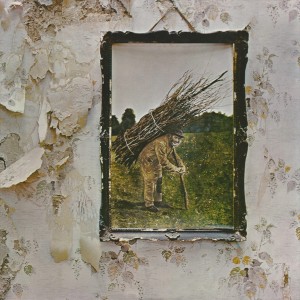

 Led Zeppelin
Led Zeppelin
| Release date | Label | Producer | Genre | Length | More info |
| 1971.11.08 | Atlantic | Jimmy Page | Classic Heavy Metal | 42:33 |  
 |
Delta blues for hobbits, Middle-earth folk for hippies.
Background
When Led Zeppelin relocated to Headley Grange at the end of 1970 to record their fourth album, they were already superheroes - actually, they became superheroes almost overnight back when their first album came out in early 1969, and their first three albums alone would have already earned them a sky high place in the pantheon. Throughout the next two years, the band never really entertained any aspiration to join the "prog leagues": for all of his innovations, Jimmy Page was a conservative at heart, his deepest love being the blues and his auxiliary love being reserved for the folk tradition (later on, the band would explore additional black music genres such as funk and even reggae, but there would be very little influence by way of modern jazz or classical music). For any band of a lesser caliber, this would have been a problem in the highly innovative age of the early Seventies, but Zeppelin had the advantage of a truly unique sound, eagerly mimicked by many heavy bands around but never as succesfully - even when Zeppelin played generic 12-bar blues, you could hardly confuse the guitar/bass/drum/vocal assault with anyone.
Rough generalization had Led Zeppelin I down as the "heavy blues" album, Led Zeppelin II as the "early heavy metal" album, Led Zeppelin III as their "folk album" (based on either average assessments or album highlights; of course, even III had its ʻImmigrant Songʼ, and already I had its ʻBabe I'm Gonna Leave Youʼ). None of this was pre-planned, but that's kind of the way that it came to be regarded, and so, logically, the fourth album could either have its own coloring or serve as a synthesis of all three - which it turned out to be, tying all the loose ends together and serving as a logical conclusion of Zep's first and greatest period (Houses Of The Holy, released two years later, would be the start of a new era not just by having a title, but also by incorporating plenty of new influences that kept the band up to speed in a highly competitive era). The most important thing about it, perhaps, is that in three years time, the band members had really matured as songwriters: for all the greatness of Led Zeppelin I, it invented a completely new sound, but only as a basis for interpretation. True writing of original riffs did not begin until II, and it was only by mid-1970 that they could be fully capable of not only providing fabulous packaging for others' content, but coming up with their own as well.
Some basic factsThere's a whole popular mythology, too, attached to the album - the reluctance to choose a title or even print their name on the front sleeve (which was the main reason that delayed the release for more than half a year), the old countryman on the album sleeve, the four magic "Zoso" symbols chosen by the band members at Page's instigation, rumors of backward messages, whatever. None of this is really all that interesting in any other respect than studying the vibes and customs of the early Seventies, maybe the only time in recent history when people like Aleister Crowley actually did have a strong cultural impact, because cheap thrills were so attractive to young rich rock stars. Much more important, maybe, is the fact that even without a single indication on the cover they never fooled anybody, and the album went on to become their biggest seller anyway.
For the
defense
It would be hard to defend Untitled based on criteria of "depth" or "intelligence". Led Zeppelin were a bunch of simple kids who happened, quite accidentally, really, to be endowed with supernatural talent - which, one might complain, they wasted on sleazy cock rock like ʻBlack Dogʼ, cartoonish fantasies like ʻBattle Of Evermoreʼ, and the cliched pathos of ʻStairwayʼ. Even worse, you could say: they attempted to combine sleazy cock and pathos, because even ʻBlack Dogʼ, instead of realistically sounding like the swagger of some sweaty roughnecks in the local bar (think Cactus or Slade), is made to sound like a chunk of deep dark black magic. The problem is - I don't care, and neither should anybody, because what really matters is the sound of it all, and even in 1971 (let alone any later period) nobody had that kind of sound.
ʻBlack Dogʼ, with its stop-and-start structure and tricky winding blues riff, would seem very much to be inspired by the likes of Mose Allison's ʻYoung Man Bluesʼ in the Who's interpretation of it, except that the Who preserved and expanded the song's anthemic, "socially-oriented" message where Page and Co. went along with the "squeeze my lemon" vibe and created yet another voodoo chant to attract impressionable young females. But they also dutifully changed the music, so that the guitar no longer howls in frustration and desperation, but pulsates like an overexcited libido. In other words, this is ʻYoung Man Bluesʼ crossed with ʻWhole Lotta Loveʼ, which makes it slightly less aggressive than the latter, but also stranger and more mysterious. And that title? Yes, it came about because, according to Page, there was a black dog running around the studio, but it also throws in a bit of eerie superstition. Maybe ʻBlack Catʼ could be even more appropriate, but then they probably thought that the guitar here is growling, after all, not purring, and besides, dogs are just... more manly or something.
Curiously, after that introduction there is no more "cock rock" on the album whatsoever - although it does go to the odd trouble of having not one, but two flashy openers in a row (I have occasionally entertained the idea of switching ʻRock & Rollʼ and ʻMisty Mountain Hopʼ places so that the two sides would become even more symmetrical); and the second one is their most open tribute to Fifties rock, so much so that it opens with the drum intro to Little Richard's ʻKeep A-Knockin'ʼ (and, on an interesting trivia note, would later be among the bunch of "new songs" covered by the aging Jerry Lee Lewis for his Last Man Standing project). Of course, the tribute is purely symbolical, because this song, too, is clearly the Devil's work: where Little Richard and Jerry Lee, for all their shocking wildness, really just came across as happy entertainers who only wanted to have fun, ʻRock & Rollʼ takes itself far more seriously - for a song that came about almost by accident, that is. Page's guitars have a fairly nasty growl to them, and Plant's "lonely lonely lonely... time" is clearly sung from the perspective of somebody who is going to get his compensation for all that loneliness right away. Come to think about it, I may have been wrong about that cock rock statement - if the protagonist of ʻBlack Dogʼ is a swaggerer trying on a voodoo charm, then the protagonist of ʻRock & Rollʼ should better be locked up before he does anything rash to his sweetheart. In any case, if this is really "Fifties rock updated all the way up to the standards of 1971", then you can clearly see how all those mothers and fathers were right about locking up their daughters.
The above mentioned symmetry of the album means that both sides start out with a couple of brutal bangs, then switch into lyrical/romantic mode, then break out the epicness, but with an interesting crossover twist: there's "romantic-apocalyptic" (ʻBattle Of Evermoreʼ), "lyrical-epic" (ʻStairwayʼ), "romantic-lyrical" (ʻGoing To Californiaʼ), and "epic-apocalyptic" (ʻWhen The Levee Breaksʼ), so things never quite repeat themselves the same way. All these four songs are classic, and are hardly in need of any defense on my part, but here are a few individual thoughts all the same:
ʻBattle Of Evermoreʼ: for some reason, I used to hate this (probably Plant's vocals - whenever there's grounds for LZ hatred, it's mostly always Plant vocals), now I agree that it is one of the most sonically unique creations of its time - when Sandy Denny's and Robert's voices rise in unison over the mandolin strum, the effect is truly mind-blowing. Actually, while it so came to pass that we usually tend to associate something conventionally beautiful (like Enya) with "Elven Music", ʻBattle Of Evermoreʼ might really qualify much better. The sound may be a little too "rough" and agitated, but it's not as if we were pressured to hold the Elves up to the rigid and rigorous classicist standards.
ʻStairway To Heavenʼ: you know what? That solo is one of the best guitar solos of all time. It is not guilty of the fact that hundreds of "epic" guitar solos have unsuccesfully tried to improve on its potential. And it does not even achieve its greatness through much - the opening bars alone suffice. We may snicker at it all we want, but it did elevate Jimmy Page from the status of "awesome guitar showman" to the status of "musical prophet", much like Hendrix, I believe, only truly came into that status with ʻLittle Wingʼ and especially ʻAll Along The Watchtowerʼ (which, by the way, probably was a serious influence - in fact, the only influence I could think of right away - for the ʻStairwayʼ solo). The funny thing is, the main theme and the instrumental passage of ʻStairwayʼ also lend their mysteriousness and grandness to the lyrics: there's no way we could take "there's a lady who's sure all that glitters is gold" seriously if it weren't for the music. (Fortunately, the cringeworthy adlib of "does anyone remember laughter?" was never imprinted in the studio version, despite featuring in almost all live renditions of the song). But the music does make it worth your while.
In fact, damn, this is pretty curious - for a bunch of guys who were living so much in the here-and-now, there's an awful lot of nostalgia, Golden Age yearning, and escapism in Untitled. All the elves and hobbits, and ʻStairwayʼ with its search-for-the-Grail theme, and then there's ʻGoing To Californiaʼ which is about settling down for some natural peace and quiet, maybe the closest they ever came to nibbling a bit of the ʻMother Nature's Sonʼ McCartney bliss. Read any salacious Zep biography about the kind of life the guys were leading on tours - kind of hinted at with ʻBlack Dogʼ and ʻRock & Rollʼ, perhaps - then listen to the rest of the album and you'd think their families were waiting for them in the Himalayas, for the lack of a Lothlorien.
All the more instructive that we finish it up with ʻWhen The Levee Breaksʼ, which is arguably the greatest transformation of a mournful folk blues into an epic, gargantuan musical ride - a virtual descent into Hell, in fact, which is how I've always felt that music. The unnerving Bonham drumbeat, which combines his usual crack-a-skull power with a cool methodic swing, as if he were cracking those skulls along a conveyer belt; the piercing, echoey, backward-recorded harmonica leads that represent the souls of the damned; and Page's slide guitar part, twisting like an evil stairway taking you, level by level, all the way down to the last circle. The bridge sections offer a little cheerful respite from all the incessant hammering, but the bridge sections come and go, whereas the hammering remains and persists. The original song was never that evil - written in commemoration of the Great Mississippi Flood, it revived plenty of sad memories and inspired creepy thoughts, but this here is basically a reinvention of it as an allegory for the coming apocalypse. If we can save our asses in California, or in the Misty Mountains, or buy ourselves a stairway to Heaven in the nick of time, we might stand a chance. For everybody else, there's nothing left to do but "going down, going down, going down...". Keep thinking about it that way, and it's one of the creepiest ways ever to finish off an album. Even the Stones preferred optimism for closers.
For the prosecution
Some predictable swipes aside - Plant occasionally going overboard with adlibbing; crude lyrics with occasionally too much Tolkien or too much hot love, etc. - there are only two songs here that have not been able to gain my appreciation after all these years. Of these, ʻFour Sticksʼ is rarely encountered as anybody's favorite: the gimmick of Bonham drumming with guess-how-many sticks aside, its groove is simply too repetitive, Robert screams his head off way too much, and actually even the four sticks do not help, because this downplays the delicious brute force with which Bonham sometimes makes even the simplest rhythms sound so exciting. However, I also do not think much of ʻMisty Mountain Hopʼ - it is true that, unlike ʻSticksʼ, this is an actual song (with some great Bonham drum work, too), but it just sounds... silly. That half-spoken verse melody, alternating with Plant's yelling, is just not very musical, isn't it? There's nothing particularly catchy about the tune, and there's no big emotional vibe that it would carry. It does try to deliver yet another escapist message (see, policemen are harassing hippies, so they're all packing up for the Misty Mountains where they'd rather be eaten up by friendly goblins and neighborly wolves), but it does not fit the aggressive music, either. Anyway, not one of those songs that truly "hits the spot".
I am also not entirely sure about some of those guitar tones that Page is getting here - for a band that prided itself so much on "rawness" of the sound, the guitars on ʻBlack Dogʼ and ʻRock & Rollʼ sound somewhat overprocessed (unless it's a feature of one of those CD-era mixes, but probably not), as if Jimmy trimmed some overtones and distortion around the edges; for that reason, actually, some of us might prefer live versions of these songs to studio ones. Then again, it's probably better to take some risks with overprocessing than refrain from experimentation altogether - and if the band were to record everything "as is", we'd never be getting that overall magnificent sound on ʻLeveeʼ, either, so on second thought, strike that from the prosecution record.
Conclusion
| Melody | Voice | Mood | Production | Innovation/Influence | Where it belongs | RYM preference | |
 |
 |
 |
 |
 |
 |
#10 (Mar 06, 2016) |

| Previous entry | Main page | Next entry |